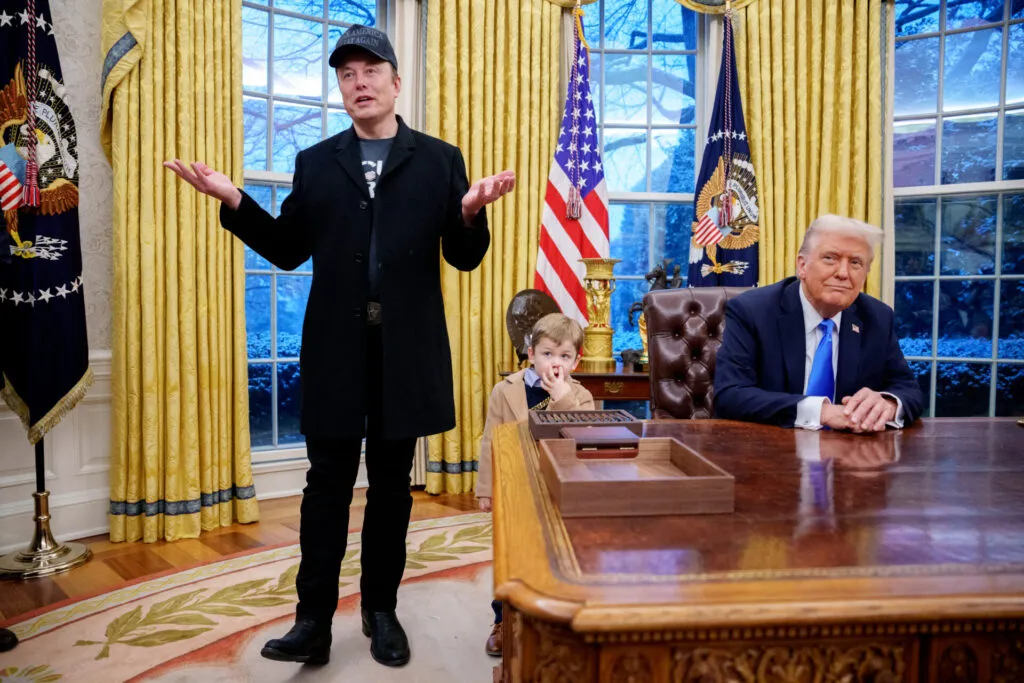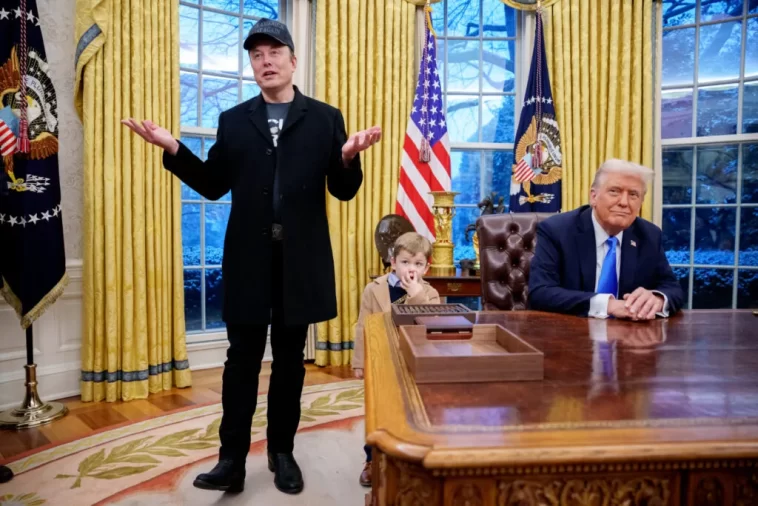
Political Shifts and Legal Ambiguities in a Tumultuous Administration
The political landscape remains in constant flux, and recent developments underscore the tricky parts of governing in an environment riddled with tension. In these pages, we take a closer look at several key issues impacting both domestic and international affairs—from high-profile resignations and policy backtracking to heated legal battles over administrative decisions. This discussion aims to figure a path through the confusing bits of political maneuvering, trade policy shifts, and judicial oversight in a style that is both neutral and analytical.
Elon Musk and the Politics of Corporate Leadership
One of the most eye-catching announcements came from Elon Musk after Tesla reported a staggering drop in profits. The unconventional billionaire, known as much for his role in technology as for his unorthodox ventures in government policy, declared he would be reducing his involvement in his public policy role. This decision, made against the backdrop of a turbulent market and diminishing poll numbers, hints at a strategic retreat from an increasingly politically charged environment.
Reassessing Political Involvement Amid Corporate Crisis
Musk’s decision to step back from leading the Department of Government Efficiency task force comes at a time when investors and consumers are grappling with a host of tangled issues including volatile market performance and public backlash. In a milieu where trust can be as fragile as the stock market, the move might be seen as an effort to realign his focus on bolstering Tesla’s core operations. His statement—that he would now dedicate “a day or two per week” to government matters—reflects a nuanced decision to balance corporate recovery with limited political involvement.
The Corporate-Political Nexus: When Business and Policy Collide
The intertwining of corporate ambition and political acumen is no straightforward road. It comes with its share of nerve-racking twists and turns, particularly when public sentiment is at odds with boardroom decisions. Critics point out that Musk’s political maneuvers could be off-putting for consumers who are already displeased with Tesla’s recent performance. The backlash is evident in the form of vandalizations and a surge in product returns—an issue that demonstrates the small distinctions between public trust and corporate success.
- Corporate distractions amid political turmoil
- Potential impact on investor confidence
- Challenges in balancing technology growth with policy influence
Such incidents serve as a reminder that when a corporate leader steps into the political arena, every decision carries legal, economic, and social weight. It’s a delicate balancing act that requires not only vision but also an intricate understanding of how to manage your way through public perception and legal scrutiny.
Congressional Realignments: Senator Durbin’s Retirement
In yet another example of shifting political lines, Senator Dick Durbin, long regarded as a stalwart in the Senate, publicly announced that he would not seek re-election. Durbin’s retirement marks the departure of a key figure who was once instrumental in shaping legislative priorities in an era that many considered to be as intimidating as it was politically charged.
Impacts on Legislative Stability and Institutional Memory
Senator Durbin’s exit is a clear signal of change within Congress. His long tenure provided a steadying influence, and his departure leaves behind a vacuum that will be hard to fill. In a chamber where every subtle detail counts, the loss of an experienced lawmaker forces both lawmakers and legal analysts to figure a path through new and potentially nebulous relationships and power dynamics.
Understanding the Ripple Effects in Governance
The retirement of a seasoned senator brings a host of implications:
- The loss of institutional memory and legislative continuity
- The reshuffling of committee assignments and power blocs within Congress
- An evolving landscape that may prove nerve-racking for long-time political insiders
Legal experts suggest that this exit might catalyze a reexamination of how leaders manage and transition leadership roles in midterm elections. Given the many tangled issues of policymaking and legal oversight, filling the void left by Durbin could pose considerable challenges for both parties, as they work to steer through complicated political strategies and complex legislative processes.
Judicial Intervention and the Case of Kilmar Abrego Garcia
An ongoing legal dispute has thrown further spotlight on the administration’s methods of managing legal processes. In a contentious case involving Kilmar Abrego Garcia—the Maryland man imprisoned in El Salvador—a U.S. District Judge has explicitly criticized the administration for ignoring court orders and obstructing the legal path designed to aid his return.
Judicial Orders and Administrative Hesitations
Judge Paula Xinis recently expressed frustration over what she described as the administration’s refusal to provide critical information regarding efforts to facilitate Garcia’s repatriation. The judge’s order demanded a detailed account of steps taken by the administration, setting a clear deadline as a final attempt to ensure judicial cooperation.
The Struggle Between Executive Discretion and Judicial Oversight
This legal episode is a fascinating case study in the limits of executive power. With the administration filing a motion to pause the judge’s order—and seeking relief from a requirement to provide daily updates—the dispute emphasizes the ongoing tussle between critical institutional checks. The case highlights the intricate balance required to manage legal obligations while maintaining a robust exercise of executive discretion.
| Aspect | Administration’s Stance | Judicial Expectation |
|---|---|---|
| Transparency | Reluctant to provide regular updates | Demands detailed status reports |
| Compliance | Moving to pause judicial orders | Requires adherence to court deadlines |
| Legal Procedure | Actions considered by some to be obstructive | Seeks straightforward cooperation |
This table encapsulates the fine points of the case, and it is emblematic of a broader conversation about executive accountability. Determining how to balance swift administrative action with the imperative of following legal mandates remains one of the most off-putting challenges in contemporary governance.
Trade Policies and Global Diplomacy: The U.S.-China Trade War
No discussion of the current political climate would be complete without addressing the dynamic and ever-shifting nature of trade policy. Recent remarks from Treasury Secretary Scott Bessent hinted at an easing of the trade war with China, sparking a surge in investor confidence. The administration appears to be taking steps that could potentially reduce tariffs significantly while adopting a more conciliatory tone in international trade negotiations.
Trade Policy Adjustments and Investor Reactions
In remarks made nearly in passing, Bessent’s suggestion that tensions with China might soon de-escalate has helped buoy U.S. markets. President Trump’s indication that tariffs might “come down substantially” adds another layer to the discussion, challenging previously hardline positions. Such policy signals are interpreted as positive by markets that have long been wary of the nerve-racking twists and turns of a full-blown trade war.
Geopolitical Implications of Tariff Adjustments
The Trump administration’s flirtation with reduced tariffs has not gone unnoticed in international corridors either. China, for its part, has responded to the U.S. overtures with a firm stance suggesting that Washington cease its provocative measures if it wishes to negotiate in good faith. The resulting dialogue, fraught with both diplomatic caution and economic calculation, highlights how delicate the process of working through international trade agreements can be.
- Easing trade tensions can boost investor confidence
- Reduced tariffs could pave the way for better international negotiations
- The balance of domestic political benefits versus international economic needs remains tricky
Ultimately, this chapter on trade policy serves as an important reminder that the hidden complexities of international negotiations are not simply economic in nature—they entail a web of legal, political, and procedural challenges. Successful resolution will require not just the willingness to negotiate, but also a careful calibration of administrative decisions in light of legal precedents and international law.
International Diplomacy Under Strain: Ukraine Peace Talks and Diplomatic Walkouts
In the realm of international diplomacy, few issues have been as incendiary as the ongoing conflict in Ukraine. Recent developments have shown enough contradictions to leave diplomats and legal analysts puzzled. With top diplomats from the U.S. and its allies withdrawing from talks that were essential in charting a course towards an end to the Russia-Ukraine conflict, uncertainties loom large.
The Case of Marco Rubio and the Shifting Dynamics of Peace Talks
The cancellation of attendance by Secretary of State Marco Rubio at these critical discussions sends a mixed signal to those following the conflict. With Kyiv rejecting a ceasefire proposal that involved ceding Crimea to Russia, the question remains: Are talks merely stalling, or is there a deeper strategic repositioning at play? Rubio’s comment from last week—emphasizing the need to “move on” if peace is unattainable—complicates the narrative further, leaving room for interpretations that range from pragmatic disengagement to a more calculated political repositioning.
Diplomatic Abandonment: Consequences for International Law and Negotiations
This diplomatic retreat raises several legal and political issues:
- Obstacles in achieving a legal framework for ceasefire agreements
- Potential long-term impacts on international negotiations
- The risk of undermining trust among diplomatic partners
Such actions complicate the already tough task of piecing through the minute details of international law and the subtle distinctions necessary to form a lasting peace. As high-stakes negotiations continue, every decision carries potential ramifications, not only for Ukraine but for the entire balance of international relations.
Media Freedom and Government-Funded Broadcasting
The Trump administration’s strategies extend beyond traditional policy arenas, entering the complex territory of media regulation. A recent federal ruling has provided a temporary shield for public media outlets such as Voice of America, in a move that underscores the critical importance of maintaining independent channels of news and information.
Legal Safeguards for Media Institutions
U.S. District Judge Royce Lamberth’s decision to order the resumption of operations at government-funded media outlets is seen by many as an essential step to ensuring transparency. By demanding that the administration take “all necessary steps” to reinstate employment and news operations, the judge reinforced the idea that adhering to judicial orders is non-negotiable—even for high-level actions on national policy.
Balancing Government Influence and Media Independence
This legal intervention serves as a significant commentary on the relationship between executive actions and the media landscape. The reinstatement of Voice of America and similar broadcasters is critical, as these institutions play an indispensable role in informing the public, especially when government communications are at stake. It also frames a larger discussion about how legal bulwarks can prevent the domination of politically driven narratives by providing a counterbalance in a noisy media environment.
- Upholding judicial oversight is key to maintaining independent news flows
- Ensuring transparency in government-funded media is essential for a democratic society
- The interplay between legal mandates and executive reluctance continues to pose tricky parts
Cultural and Ceremonial Moments Amid Political Upheaval: The Vatican and Pope Francis
While the U.S. grapples with domestic policy and international conflicts, monumental cultural moments in the global sphere often provide an opportunity to step back and reflect on more enduring values. The current events in Vatican City, with Pope Francis’s body lying in state, offer an intriguing counterpoint to the otherwise contentious political climate.
The Role of Ceremonial Traditions in Public Life
News of Pope Francis lying in state in St. Peter’s Basilica invites both legal scholars and the general public to consider the role of ceremonial traditions as essential elements of cultural continuity. Even amid political turbulence, these respectful rituals serve as stabilizing points—a reminder that while political ambitions and policies may shift, certain cultural and religious symbols persist as touchstones of national and international identity.
Public Mourning Versus Political Discourse
The juxtaposition of a solemn public moment against a backdrop of high-stakes political maneuvering presents a rich tapestry of issues:
- The intersection of law, culture, and public sentiment
- How ceremonial events can influence or distract from political controversies
- The role of religious institutions in providing continuity during politically off-putting times
This scenario underscores the idea that sometimes, taking a closer look at cultural milestones can offer a more balanced perspective on recent political decisions. It reminds policymakers—and legal scholars alike—that amidst the nerve-racking aspects of policy and legal disputes, there are moments when the collective memory of society is reenergized by tradition and shared values.
Reflections on the Administration’s Legal and Ethical Challenges
The spectrum of challenges faced by the Trump administration is wide-ranging, spanning from corporate betrayals and legislative resignations to international crises and media interventions. Each component of this multifaceted story encapsulates broader themes of accountability, transparency, and institutional resilience.
Key Legal Confrontations and Their Broader Impacts
A number of recent issues highlight just how intertwined administrative choices are with legal obligations. The contentious handling of the case involving Kilmar Abrego Garcia is emblematic of this, drawing attention to how legal mandates and judicial directives must remain respected regardless of political considerations. Moreover, the swift moves to potentially reduce trade tensions with China further emphasize that the law is omnipresent—even in arenas initially defined by economic negotiations.
The Principle of Accountability in a Changing Political Landscape
In an era where political decisions seem to be made on the fly, the principle of accountability becomes even more essential. Whether it’s through judicial oversight, as seen in the intervention with media outlets, or through the measured retreat of influential figures like Elon Musk and Senator Durbin, the common thread is a delicate balance between executive discretion and legal obligation. This balance is critical in ensuring that political decisions are not only effective but also lawful and ethically sound.
- Judicial oversight serves as a critical counterbalance to executive power.
- Administrations must be prepared to manage their way through both public scrutiny and legal requirements.
- Legacy decisions, such as those impacting media freedom, underscore the long-term consequences of administrative choices.
Every decision taken in this administration must be viewed through the prism of its legal, economic, and cultural repercussions. The hidden complexities of each policy decision—coupled with small distinctions in legal interpretations—require all stakeholders to dig into the fine points of the matter. It is only by appreciating the full scope of responsibilities that leaders can hope to find their way through this labyrinth of modern governance.
Looking Ahead: The Future of Policy and Legal Precedent
As we move further into what may well be a defining era for U.S. politics, the coming months will likely see more reevaluations of current strategies. Whether it is through a series of legal challenges or the shifting allegiances within Congress, it is clear that the road ahead is replete with both professional opportunities and challenging bits alike.
Anticipating Legal Reforms and Policy Adjustments
Looking forward, legal experts and political analysts alike are already formulating ideas on how best to manage these tricky parts of public policy. Some potential areas for reform include:
- Improving transparency and accountability in executive decisions
- Strengthening judicial oversight to ensure that all branches operate within their legal limits
- Ensuring that economic policies, especially those pertaining to international trade, follow a clear and legally sound pathway
Such reforms are super important if the government is to maintain public trust while remaining flexible enough to address an array of domestic and international challenges. Moreover, these proposals underscore the need for a bipartisan approach—one that makes it easier for leaders to figure a path through the nerve-racking intersections of executive policy and judicial mandates.
Building Consensus Among Diverse Stakeholders
A lasting resolution to these issues requires dialogue among a wide array of stakeholders—from legal experts and policymakers to business leaders and international partners. In an era when every decision is scrutinized not just for its immediate impact but also for its long-term legal implications, building consensus is not just desirable—it is a must-have.
- Open channels between the legislature and the judiciary will facilitate smoother policy implementation
- Engaging business leaders in the policy-making process can help mitigate unforeseen corporate risks
- Maintaining an independent media that rigorously covers both the strengths and shortcomings of government initiatives remains a key factor for accountability
This holistic approach—mixing legal rigor with pragmatic political reforms—could well be the blueprint for successful governance in times when government actions are constantly under the microscope.
Conclusion: Balancing Legal Mandates and Political Realities
From the shifting role of a high-profile business leader like Elon Musk to the consequential departure of long-time lawmakers, the current period is both exciting and filled with challenging bits. The ongoing legal disputes, trade negotiations, and international diplomatic maneuvers serve as a reminder that the interplay between law and politics is never straightforward. Instead, it is defined by subtle twists and turns that require both insight and flexibility.
As we continue to closely watch these developments, it is essential that all involved—from government officials to private citizens—acknowledge and respect the legal frameworks that underpin our democratic processes. Only by balancing the need for rapid political action with adherence to established legal principles can true progress be made in an environment that is as full of problems as it is full of promise.
The coming months will undoubtedly bring more challenges and opportunities, and it is our responsibility, as legal scholars, policymakers, and engaged citizens, to work together to ensure that every decision made today lays a solid, lawful foundation for tomorrow’s society.
Originally Post From https://www.usnews.com/news/national-news/articles/2025-04-23/midday-must-reads-trump-elon-musk-backtrack-on-china-doge
Read more about this topic at
The shifting political landscape of what we trust
Shifting Political Landscapes during Lincoln’s Presidency


